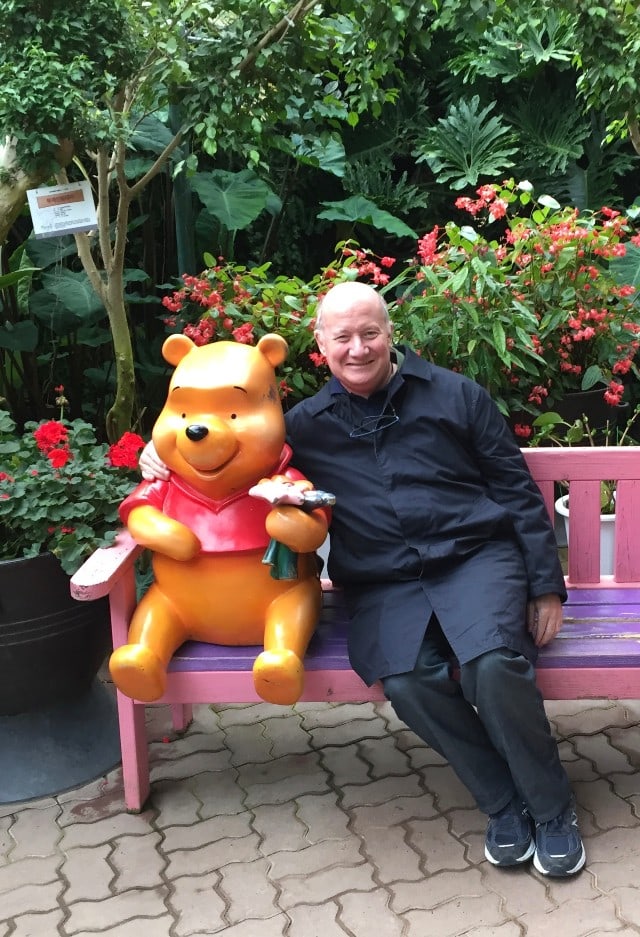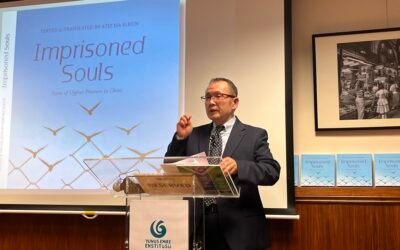
Proofs of a conspiracy: Bitter Winter’s editor-in-chief Massimo Introvigne with Winnie the Pooh
CCP’s ban on Winnie the Pooh, in force since the character has been compared to President Xi Jinping in 2013, reaches new extremes.
Massimo Introvigne
Bitter Winter readers may not be familiar with Theme Park University, a publication devoted to Disney and other theme parks around the world. Yet, the issue of November 24, 2018, was well worth reading. It reported rumors that Shanghai Disneyland may be compelled to eliminate all references and attractions featuring Winnie the Pooh, the beloved teddy bear character created by British author Alan Alexander Milne (1882–1956) in 1925 (for a Christmas short story; the first book appeared in 1926) and made famous by Disney’s animated versions that started in 1966. “That’s right, Theme Park University commented, no more character meet and greets, no more merchandise and the attractions could get rethemed.” This refers to two popular Shanghai Disneyland attractions, The Many Adventures of Winnie the Pooh and the teacup ride Pooh’s Hunny Pot Spin. The popular news site Inquisitr commented that this may be very expensive for Disney: “the re-theming of the two attractions would be very costly”—“but there may be no choice.”
No, we are not in April and this is not an April Fool’s joke. In fact, the CCP is cracking down on Winnie the Pooh and his friends as if they were a xie jiao, a banned heterodox movement. As CNN had already reported in 2017, in the tightly controlled Chinese Internet, those who search for “Winnie the Pooh” may receive a message telling them that distributing information about Milne’s teddy bear is actually illegal, and references to the Pooh are also banned from popular Chinese platforms such as WeChat and Sina Weibo.

The viral 2013 image comparing Xi and Obama to Pooh and Tigger
Has the CCP gone mad? In fact, all started in 2013 when somebody compared to an image of Pooh and his friend Tigger a picture of President Xi Jinping and Barack Obama, who met at the G20 in Saint Petersburg (some sources incorrectly link the image to a visit by Obama to China in 2013, while this visit happened in 2014). This was regarded as lese-majesty in China, in a climate of increasing personality cult of Xi Jinping and paranoia suspecting “counter-revolutionary” activities behind any criticism or even joke about the CCP.
Notwithstanding, or perhaps because, it was banned, the image of Xi Jinping as the Pooh went viral. As the crackdown escalated, Winnie the Pooh became a symbol of resistance to the regime. Dissident Liu Xiaobo (1955–2017) and his wife were photographed in the hospital where Liu had been admitted, both holding Pooh mugs.
In August 2018, it was announced that Disney live action movie Christopher Robin, which features Winnie the Pooh, will be banned and will not be released in China. In the trailer of the new popular video game Kingdom Hearts 3, Winnie the Pooh has also been censored in China. A white spot replaces the teddy bear, while the other characters are still there.
The matter is becoming deadly serious. It offers a grim picture of the siege mentality of Xi’s CCP. If even Winnie the Pooh is banned, what hope of freedom can exist for ideas and groups more seriously disturbing the regime?

The trailer of Kingdom Hearts 3, with a white spot replacing the censored Pooh

Massimo Introvigne (born June 14, 1955 in Rome) is an Italian sociologist of religions. He is the founder and managing director of the Center for Studies on New Religions (CESNUR), an international network of scholars who study new religious movements. Introvigne is the author of some 70 books and more than 100 articles in the field of sociology of religion. He was the main author of the Enciclopedia delle religioni in Italia (Encyclopedia of Religions in Italy). He is a member of the editorial board for the Interdisciplinary Journal of Research on Religion and of the executive board of University of California Press’ Nova Religio. From January 5 to December 31, 2011, he has served as the “Representative on combating racism, xenophobia and discrimination, with a special focus on discrimination against Christians and members of other religions” of the Organization for Security and Co-operation in Europe (OSCE). From 2012 to 2015 he served as chairperson of the Observatory of Religious Liberty, instituted by the Italian Ministry of Foreign Affairs in order to monitor problems of religious liberty on a worldwide scale.



